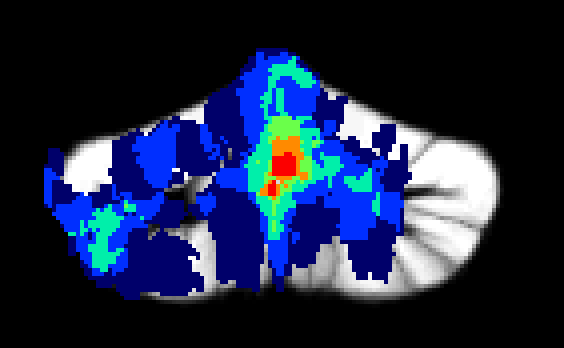
Experimentelle Neurologie
Upcoming Events
* Special event *
Symposium zu Ehren der Bernd Fink-Stiftung: Wie arbeitet das Kleinhirn beim Menschen? Freitag, den 21.02.2025, 16.00-18.30 Uhr. Deichmann Auditorium, Uniklinikum Essen, Virchowstr. 163 a. Das Symposium richtet sich an interessierte Laien. Eine Voranmeldung ist nicht notwendig.
* Seminar series (Neurophysiologisches Seminar) *
Dr. Nicolas Diekmann (Institute for Neural Computation, Faculty of Computer Science, Ruhr University Bochum): „Modeling context-dependent extinction learning using reinforcement learning.” Thursday, 12.06.2025, 5.15 – 6.45 pm. Hybrid event, please contact Dagmar Timmann for details.
* Journal-Club *
Aditya Umarjikar presents the study „Shahshahani L et al. Selective recruitment of the cerebellum evidenced by task-dependent gating of inputs. Elife. 2024 Jul 9;13:RP96386″. Monday, 14.07.2025, 5.30 pm – 6.30 pm; Hybrid event, please contact Dagmar Timmann for details.
* Cerebellum-Club SFB1280 *
Melanie Mark and Dagmar Timmann will present the posters for the SFB1280 review to invite critical feedback. Friday, 27.06.2025, 4.00 pm – 4.45 pm. via Zoom, please contact Dagmar Timmann for details.
* Key-note lecture Seminar series (Neurophysiologisches Seminar) *
Prof. Dr. Detlef H. Heck (Department of Biomedical Sciences, University of Minnesota Medical School, Duluth Campus, MN, USA) will give a lecture about „Cerebro-cerebellar interaction and cognitive function: a neuronal perspective.” Thursday, 17.07.2025, 17.15 – 18.30 am; Hybrid event, please contact Dagmar Timmann for details. Sponsored by SFB1280
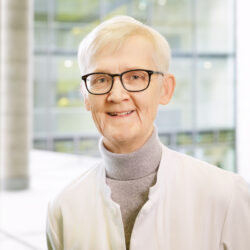
Univ.-Prof. Dr. med.
Dagmar Timmann-Braun
Professur für Experimentelle Neurologie
Marie Skłodowska-Curie Innovative Training Network
The consortium, called CEN (cerebellum & emotional networks), brings together researchers from across Europe and will address the contribution of the cerebellum in the control of emotions, and in particular fear and anxiety. Please see the CEN webpage for further information on our consortium.
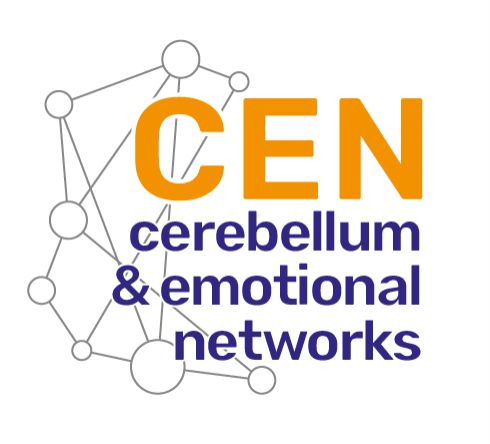
FOR 5429 MeMoSLAP
The new research unit “Modulation of brain networks for memory and learning by transcranial electrical brain stimulation: A systematic, lifespan approach (MeMoSLAP)” is funded by the German Research Foundation. Our group will investigate whether focalized tDCS based on the individual cerebellar anatomy reliably enhances cerebellar-dependent motor learning.
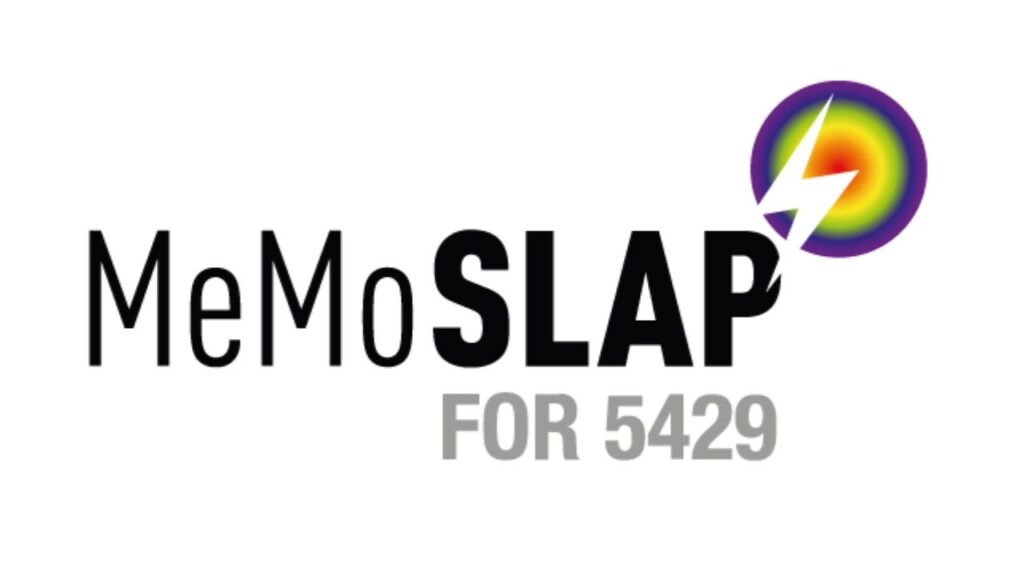
SFB1280 Extinction Learning
Second funding period has been granted by the German Research Foundation. Our group investigates the contribution of the cerebellum to extinction learning.
TRR289 Treatment Expectation
Our group contributes a project to the second funding period of the TRR 289 Treatment Expectation. We will investigate the contribution of the cerebellum to placebo and nocebo effects.

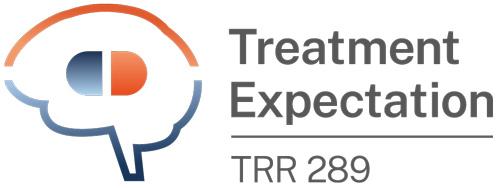
Congratulations!
Caroline Nettekoven got a paper accepted in the Journal of Neuroscience. She was able to show that motor training improves impaired cortico-cerebellar connectivity in patients with cerebellar degeneration.
Alice Doubliez got her study about the effects of dopaminergic and anti-dopaminergic drug effects on fear extinction learning accepted in the Journal Brain communications.
Frederik Schlitt won a poster prize about his study on placebo and nocebo effects in patients with cerebellar degeneration at this year’s SIPS meeting in Krakow, Poland.
Qi Liu won a scholarship from Research Explorer Ruhr 2025 and will visit our lab in June, 2025.
Seyed Ali Nicksirat has successfully defended his medical doctoral thesis on April 16, 2025.
Enzo Nio and Patrick Pais Pereira have been awarded treasure chest funding of the SFB 1280.
Antonia Baumgarten has been awarded a scholarship to support the work on her medical thesis as part of the TRR Treatment Expectation.
Andreas Thieme got his validation study of the German version of the CCAS scale accepted in the Journal of Neurology.
Dana Huvermann got a paper accepted in the Journal of Neuroscience. This work has been done on collaboration with Jutta Peterburs (MSH Hamburg).
Nikolai Petrenko got a paper accepted in Behav Brain Res.
Enzo Nio got a paper accepted in eLife.
Lana Inoue has successfully defended her medical doctoral thesis on January 14, 2025.
Qi Liu and Andreas Thieme got a paper accepted in the Journal of Neurology.
Patrick Pais Pereira and Paula Steinhoff won a poster prize at this year’s Forschungstag of the Essen University Hospital (22.11.24).
Friedrich Erdlenbruch won a 2nd poster prize at the 97. Annual Meeting of the German Neurology Society in the category “Neurogenetics and Rare Neurological Diseases”, 6.11.-9.11.24 in Berlin.
Friedrich Erdlenbruch has been awarded a scholarship as part of the UMEA – Clinician Scientist Programm for three years (2024-2027).
Laurenz Engel has been awarded a scholarship as part of the Promotionskolleg ELAN für Medizinstudierende.
Björn Koch has successfully defended his medical doctoral thesis on July 31, 2024.
The German Research Foundation has approved the second funding period of the SFB/TRR 289 Treatment Expectation. Our (new) project “How does the cerebellum contribute to placebo hypoalgesia and nocebo hyperalgesia?” has been approved.
Dana Huvermann was awarded a poster prize at the 49th Annual Conference “Psychology and the Brain, PUG”, at the University of Hamburg, 29.5. – 1.6.24.
Milan Rieger has been awarded a scholarship as part of the Promotionskolleg ELAN für Medizinstudierende.
Dagmar Timmann was awarded the Große Forschungspreis der DGKN 2024 (Grand Research Prize of the DGKN 2024).
Patrick Pais Pereira won a first posterprize at the 96. Annual Meeting of the German Neurology Society, 6.11.-9.11.23 in Berlin.
The project Involvement of the human cerebellum in reinforcement learning via its connection with the ventral tegmental area (VTA) will be funded by the DFG for three years. It is a joint project between Dagmar Timmann‘s group and the groups of Ulrike Bingel and Matthias Brand.
Enzo Nio won a poster prize at the 2023 Gordon Research Conference (GRC) on the Cerebellum.
Andreas Thieme gave a talk at the minisymposium “Cognitive and Affective Functions of the Cerebellum” at the 2023 SFN meeting in Washington, which will also be featured as part of a minireview in the annual meeting issue of the Journal of Neuroscience. He won a scholarship from the DAAD to sponsor his trip.
Andreas Thieme has been awarded a research grant from the German Heredoataxia Foundation (DHAG).
Dominik Jäschke‘s and Andreas Deistung‘s paper on “Age-Related Differences of Cerebellar Cortex and Nuclei: MRI findings in Healthy Controls and its Application to Spinocerebellar Ataxia (SCA6) Patients” has been accepted for publication in Neuroimage.
Manuel Rauscher has successfully defended his medical doctoral thesis on November 4th, 2022.
Dana M. Huvermann has been awarded a prize for best poster at the 95. Annual Meeting of the German Neurology Society, 1-5 November 2022.
Dagmar Timmann has been accepted as participant of the Raynor Cerebellum Project Big Ideas Summit in New Mexico in September 2022, an initiative of the of the UT Southwestern O’Donnell Brain Institute.
Jonathan S. Tsay, 4th year PhD student, University of California, Berkeley, USA won a travel grant of ThinkGlobal RUB to visit our lab this summer (2022).
Caroline Nettekoven, PhD, Western University, London, ON, Canada won a travel grant of ThinkGlobal RUB to visit our lab this summer (2022).
Nikolaj Petrenko, MD, PhD, won a UDE Fellowship for Reseachers from Ukraine, to visit our lab for six months in 2022. The fellowship has successfully been extended till March, 2023.
Dr. Giorgi Batsikadze‘s paper on “The cerebellum contributes to context-effects during fear extinction learning: a 7T fMRI study” has been accepted for publication in Neuroimage.
Dr. Andreas Thieme‘s paper on “The CCAS-Scale in hereditary ataxias: Helpful on the group level, particularly in SCA3, but limited in individual patients” has been accepted for publication in Journal of Neurology.
Dr. Rossitza Draganova‘s paper on “Motor training-related brain reorganization in patients with cerebellar degeneration” has been accepted for publication in Human Brain Mapping.
Dr. Andreas Deistung‘s paper on “Quantitative Susceptibility Mapping Reveals Alterations of Dentate Nuclei in Common Types of Degenerative Cerebellar Ataxias.” has been accepted for publication in Brain Communications.
Dr. Thomas Ernst has been awarded the Erwin L. Hahn Young Scientists Award on November 3rd, 2021.
Kristina Köster has been awarded a UDE-stipend in 2021 and 2022.
Thomas Ernst has successfully defended his doctoral thesis on September 1st, 2021.
Dominik Jäschke has successfully defended his medical doctoral thesis on August 19th, 2021.
Andreas Thieme has been selected for participation in Global Young Faculty VII, an initiative of Stiftung Mercator in cooperation with the University Alliance Ruhr.
Our group is one of the recruitment centers of the newly funded project “Spinocerebellar ataxias: Advanced imaging with ultra-high field MRI (SCAIFIELD)” coordinated by Prof. Tony Stöcker at the DZNE, carried out within the framework of the “EU Joint Program – Neurodegenerative Disease Research (JPND)”.
Liane John has successfully defended her medical doctoral thesis on June 30th, 2021.
Ariels Mamlins has successfully defended his medical doctoral thesis on May 28th, 2021.
Sarah Jansen has successfully defended her medical doctoral thesis on May 12th, 2021.
Jan Lipp has successfully defended his medical doctoral thesis on May 7th, 2021.
Andreas Thieme has been awarded a Top Young Science Best Paper Award by the Medical Faculty, University of Duisburg-Essen for his recent publication in Brain (Brain. 2021 Mar 3;144(2):e20. doi: 10.1093/brain/awaa417).
The Bernd Fink – Foundation will fund the project “Cognitive and affective abnormalities in patients with cerebellar disease” for two years starting in June 2021.
Rossitza Draganova‘s paper on “Neurostructural changes and declining sensorimotor function due to cerebellar cortical degeneration.” has been accepted for publication in the Journal of Neurophysiology.
Carlos Gomes‘s paper on “Resection of cerebellar tumours causes widespread and functionally relevant white matter impairments.“ has been accepted for publication in Human Brain Mapping.
Otilia Kimpel‘s and Marcus Gerwig‘s paper on “Long-term effects of cerebellar transcranial direct current stimulation (tDCS) on the acquisition and extinction of conditioned eyeblink responses” has been accepted for publication in Scientific Reports.
Katharina M. Steiner has been awarded a prize for best e-poster at the 93. Annual Meeting of the German Neurology Society, 4-7 November 2020.
Katharina M. Steiner successfully applied for a grant of the UMEA – Clinician Scientist Programm which is funded by the DFG. She will be funded for three years. The project will be done at the Department of Psychiatry, LVR-Klinikum Essen (Prof. Kölkebeck, Prof. Scherbaum) in collaboration with the Department of Neurology (Prof. Timmann).
Andreas Thieme‘s Letter to the Editor “Reference values for the Cerebellar Cognitive Affective Syndrome Scale: Age and education matter.” has been accepted by Brain. Furthermore, his paper “Validation of a German version of the Cerebellar Cognitive Affective/ Schmahmann Syndrome Scale: preliminary version and study protocol” has accepted for publication in Neurological Research and Practice.
Lana Inoue‘s and Giorgi Batsikdaze‘s paper on Interaction of fear conditioning with eyeblink conditioning supports the sensory gating hypothesis of the amygdala in men has been accepted for publication in the journal eNeuro.
Linda Beyer has successfully defended her medical doctoral thesis on June 3rd, 2020.
Seyed Ali Nicksirat won a Junior Clinician Scientist scholarship which allows him to work in the lab for three months full-time.
Katharina M. Steiner‘s paper on Extinction of Cognitive Associations Is Preserved in Patients With Cerebellar Disease has been accepted for publication in the journal Neurobiology of Learning and Memory.
Simba Oostdam has successfully defended his medical doctoral thesis on January 30th, 2020.
Johanna Reinold has successfully defended her medical doctoral thesis on December 20th, 2019.
Jan Lipp‘s and Rossitza Draganova‘s paper on Prefrontal but not cerebellar tDCS attenuates renewal of extinguished conditioned eyeblink responses has been accepted for publication in the journal Neurobiology of Learning and Memory.
Katharina M. Steiner as been awarded a prize for best poster at the 92. Annual Meeting of the German Neurology Society, 26-29 September 2019.
Jens Claassen‘s paper on Cerebellum is more concerned about visceral than somatic pain has been accepted for publication in the journal JNNP.
Thomas Ernst‘s paper on The cerebellum is involved in processing of predictions and prediction errors in a fear conditioning paradigm has been accepted for publication in the journal eLIFE.
Otilia Negruta has successfully defended her medical doctoral thesis on July 3rd, 2019.
Sarah Müller has successfully defended her medical doctoral thesis on May 31th, 2019.
Lana Inoue has been awarded the Masao Ito Award for Best Poster for the presentation of her poster „Can cerebellar-dependent motor responses modulate extinction of conditioned fear?“ at the 10. International Meeting of the Society for Research on the Cerebellum and Ataxias (SRCA), 16-17 May 2019, in Sheffield, UK
Anne Enders has successfully defended her medical doctoral thesis on April 30th. 30th, 2019.
Giorgi Batsikadze‘s paper on the Effects of cerebellar transcranial direct current stimulation on cerebellar-brain inhibition in humans: a systematic evaluation has been accepted for publication in the journal Brain Stimulation.
Michael Küper‘s paper on Cerebellar transcranial direct current stimulation modulates the fMRI signal in the cerebellar nuclei in a simple motor task has been accepted for publication in the journal Brain Stimulation.
Ariels Mamlin‘s paper on No effects of cerebellar transcranial direct current stimulation (tDCS) on force field and visuomotor reach adaptation in young and healthy subjects has been accepted for publication in the Journal of Neurophysiology.
Welcome!
We welcome Eline Kruithof, PhD. She will work as a postdoc in our lab as part of TRR289 (Treatment Expectation).
We welcome Sören Konrad, MD. He will work on his medical thesis in our lab.
Research group and research interests
Dagmar Timmann, MD, Associate Professor
Research Interests
The motor control Dagmar Timmann’s group is interested has a long-standing interest in the physiology and pathophysiology of the human cerebellum. A major interest is the involvement of the human cerebellum in different forms of motor learning. We are interested in the contribution of the cerebellum to acquisition and extinction processes. Questions addressed are whether the cerebellum is involved in particular forms of learning, which cerebellar areas are involved and what the mechanisms of cerebellar involvement are. Another interest is the role of the cerebellum in cognition.
A main focus is the study of patients with defined cerebellar pathology. Localization of focal cerebellar lesions and extent of atrophy in cerebellar degeneration are defined based on high-resolution structural MRI. Lesion data is correlated with findings in neurophysiological and psychological experiments. In addition, functional MRI studies are performed using 3T and 7T MR scanners. Transcranial direct current Non-invasive brain stimulation (tDCS) is used to modulate cerebellar function in healthy subjects and patients with cerebellar disease.

Univ.-Prof. Dr. med.
Dagmar Timmann-Braun
Professur für Experimentelle Neurologie
Curriculum Vitae
Academic education
1988 MD, University of Tübingen, Germany
1990 Dr. med., University of Tübingen
1996 Specialist in Neurology
1998 Habilitation with the venia legendi for Neurology, University of Essen, Germany
Academic positions
1989-1993 Intern/resident Department of Neurology, University Clinic Essen, Germany
1993-1994 Postdoc at the Arizona State University (Dr. G. Stelmach), Tempe, and Barrow Neurological Institute (Dr. J. Bloedel), Phoenix, Arizona, USA
1994-1995 Postdoc at the R.S. Dow Neurological Sciences Institute (Dr. F. Horak), Portland, Oregon, USA
1995-1997 Resident Department of Neurology, University Clinic Essen
1998-1999 Postdoc at the University of Western Ontario, Department of Physiology (Dr. J. Hore), London, Ontario, Canada
since 2000 Associate Professor (C3) of Experimental Neurology, Department of Neurology, University Clinic Essen
2006 Visiting Scientist at the University of Western Ontario, Department of Physiology (Dr. J. Hore), London, Ontario, Canada
2011 and 2017 Visiting Scientist at the Human Sensorimotor Control Laboratory (Dr. J. Konczak), University of Minnesota, USA
Further activities
since 1997 Medical advisory board, German Heredo-Ataxia Society
since 2000 Head of the Ataxia Clinic, Department of Neurology, University Clinic Essen
2006-2017 Deputy chairman of the Human research ethics committee, University Clinic Essen
2007-2012 Treasurer, Society for Research on Cerebellum
since 2016 Associated Principle Investigator Erwin L. Hahn Institute of Magnetic Resonance Imaging
since 2017 Co-speaker SFB 1280 (Extinction learning; speaker O. Güntürkün, RUB) since 2021 Deputy Network Coordinator ITN “Cerebellum and Emotional Networks” (CEN)
Members of the Group (Phone, Email)
- Sillay Azizi, MD, +49 201 723 2594, sillay.azizi@uk-essen.de
- Giorgi Batsikadze, Postdoc , +49 201 723 3815, giorgi.batsikadze@uk-essen.de
- Beate Brol, technician , +49 201 723 2594, beate.brol@uni-duisburg-essen.de
- Alice Doubliez, PhD student, +49 201 723 3769, alice.doubliez@uk-essen.de
- Friedrich Erdlenbruch, MD, UMEA Clinician Scientist, +49 201 723 3815, friedich.erdlenbruch@uk-essen.de
- Thomas Ernst, Lab manager, +49 201 723 2594, thomas.ernst@uk-essen.de
- Carlos Gomes, PhD, +49 201 723 2594, carlosalexandre.assuncaodiasgomes@uk-essen.de / carlos.assuncaodias@ruhr-uni-bochum.de
- Sönke Konrad, MD, +49 201 723 3815, SoenkeHannes.Konrad@uk-essen.de
- Eline Kruithof, PhD, Postdoc, +49 201 723 3815; eline.kruithof@uk-essen.de
- Enzo Nio, PhD student, +49 201 723 3769, enzo.nio@uk-essen.de
- Nikolai Petrenko, Postdoc, +49 201 723 3815, mykola.petrenko@uk-essen.de
- Frederik Schlitt, Postdoc, +49 201 723 3815, frederik.schlitt@uk-essen.de
- Zsofia Spisak, MSc, +49 201 723 2594, zsofia.spisak@uk-essen.de
- Dagmar Timmann, MD, +49 201 723 2180/2594, dagmar.timmann-braun@uk-essen.de
- Andreas Thieme, MD, +49 201 723 2594, andreas.thieme@uk-essen.de
- Aditya Balkrishna Umarjika, PhD student, +49 201 723 3816, aditya.umarjika@uk-essen.de
- Annegret Vanlent-Theissen, secretary, +49 201 723 2180, annegret.vanlent-theissen@uk-essen.de
Student help: Mandy Barth, Laurenz Engel, Daria Kireylioglu, Patrick Pais Pereira, Katharina Pickströer, Dana Reschwamm, Milan Rieger, Merle Sommerig, Greta Wippich
Medical doctoral students: Antonia Baumgarten (TRR 289 scholarship), Laurenz Engel (ELAN scholarship), Lara Jablonski, Daria Kireylioglu, Michael Klein, Kristina Köster, Naomi Johanna Müller, Lara Müntefering, Patrick Pais Pereira, Milan Rieger (ELAN scholarship), Sarah Schellen, Paula Steinhoff (ELAN scholarship), Julie Urrutia, Raquel van der Veen
External group members: Bilge Albayrak, MD (UMEA clinician scientist); Dae-In Chang, MD; Marcus Gerwig, MD; Michael Küper, MD; Seyed Ali Nicksirat, MD; Katharina Marie Steiner, MD (UMEA clinician scientist)
Phone numbers
+49 201 723 3815/ 2594 (Lab, ground floor)
+49 201 723 2865 (Lab, basement)
+49 201 723 3769 (Lab, ground floor)
+49 201 723 3816 (Lab, basement) +49 201 723 5969 (Lab, Fax)
Funding
The group is funded by the German Research Foundation (Deutsche Forschungsgemeinschaft, DFG), EU (Horizon 2020), Mercator Research Center Ruhr, Else-Kröner Promotionskolleg ELAN, the University Medicine Essen Clinician Scientist Academy UMEA, the German Heredoataxia Society and the Bernd Fink – Foundation.
Important publications
Huvermann DM, Berlijn AM, Thieme A, Erdlenbruch F, Groiss SJ, Deistung A, Mittelstaedt M, Wondzinski E, Sievers H, Frank B, Göricke SL, Gliem M, Köhrmann M, Siebler M, Schnitzler A, Bellebaum C, Minnerop M, Timmann D+, Peterburs J+. The cerebellum contributes to prediction error coding in reinforcement learning in humans. J Neurosci. 2025 Mar 26:e1972242025. (+ equal contribution)
Nio E, Pais Pereira P, Diekmann N, Petrenko M, Doubliez A, Ernst TM, Batsikadze G, Maderwald S, Deuschl C, Üngör M, Cheng S, Merz CJ, Quick HH, Timmann D. Human cerebellum and ventral tegmental area interact during extinction of learned fear eLife. 2025;14:RP105399.
Batsikadze G, Pakusch J, Klein M, Ernst TM, Thieme A, Nicksirat SA, Steiner KM, Nio E, Genc E, Maderwald S, Deuschl C, Merz CJ, Quick HH, Mark MD, Timmann D. Mild Deficits in Fear Learning: Evidence from Humans and Mice with Cerebellar Cortical Degeneration. eNeuro. 2024 Feb 26;11(2):ENEURO.0365-23.2023.
Deistung A, Jäschke D, Draganova R, Pfaffenrot V, Hulst T, Steiner KM, Thieme A, Giordano IA, Klockgether T, Tunc S, Münchau A, Minnerop M, Göricke SL, Reichenbach JR, Timmann D. (2022) Quantitative susceptibility mapping reveals alterations of dentate nuclei in common types of degenerative cerebellar ataxias. Brain Commun. 4(1):fcab306.
Batsikadze G, Diekmann N, Ernst TM, Klein M, Maderwald S, Deuschl C, Merz CJ, Cheng S, Quick HH, Timmann D (2022) The cerebellum contributes to context-effects during fear extinction learning: A 7T fMRI study. Neuroimage. 253:119080.
Gomes CA, Steiner KM, Ludolph N, Spisak T, Ernst TM, Mueller O, Göricke SL, Labrenz F, Ilg W, Axmacher N, Timmann D. (2021) Resection of cerebellar tumours causes widespread and functionally relevant white matter impairments. Hum Brain Mapp. 2021 Apr 15;42(6):1641-1656.
Inoue L, Ernst TM, Ferber II, Merz CJ, Timmann D, Batsikadze G. (2020) Interaction of fear conditioning with eyeblink conditioning supports the sensory gating hypothesis of the amygdala in men. eNeuro. 2020;ENEURO.0128-20.2020.
Ilg W, Seemann J, Giese M, Traschütz A, Schöls L, Timmann D, Synofzik M. (2020) Real-life gait assessment in degenerative cerebellar ataxia: Toward ecologically valid biomarkers. Neurology. 95(9):e1199-e1210.
Ernst TM, Brol AE, Gratz M, Ritter C, Bingel U, Schlamann M, Maderwald S, Quick HH, Merz CJ, Timmann D. (2019) The cerebellum is involved in processing of predictions and prediction errors in a fear conditioning paradigm. Elife. 8:e46831.
Batsikadze G, Rezaee Z, Chang DI, Gerwig M, Herlitze S, Dutta A, Nitsche MA, Timmann D. (2019) Effects of cerebellar transcranial direct current stimulation on cerebellar-brain inhibition in humans: A systematic evaluation. Brain Stimul. 12:1177-1186.
Donchin O, Timmann D. (2019) How to help cerebellar patients make the most of their remaining learning capacities. Brain. 142:492-495.
Mamlins A, Hulst T, Donchin O, Timmann D, Claassen J. (2019) No effects of cerebellar transcranial direct current stimulation on force field and visuomotor reach adaptation in young and healthy subjects. J Neurophysiol. 121:2112-2125.
Tran L, Huening BM, Kaiser O, Schweiger B, Sirin S, Quick HH, Felderhoff-Mueser U, Timmann D. (2017) Cerebellar-dependent associative learning is impaired in very preterm born children and young adults. Sci Rep. 7:18028.
Weissbach A, Werner E, Bally JF, Tunc S, Löns S, Timmann D, Zeuner KE, Tadic V, Brüggemann N, Lang A, Klein C, Münchau A, Bäumer T. (2017) Alcohol improves cerebellar learning deficit in myoclonus-dystonia: A clinical and electrophysiological investigation. Ann Neurol. 82:543-553.
Hulst T, John L, Küper M, van der Geest JN, Göricke SL, Donchin O, Timmann D. (2017) Cerebellar patients do not benefit from cerebellar or M1 transcranial direct current stimulation during force-field reaching adaptation. J Neurophysiol. 118:732-48
Stefanescu MR, Dohnalek M, Maderwald S, Thürling M, Minnerop M, Beck A, Schlamann M, Diedrichsen J, Ladd ME, Timmann D. (2015) Structural and functional magnetic resonance imaging abnormalities of cerebellar cortex and nuclei in spinocerebellar ataxia type 3, spinocerebellar ataxia type 6, and Friedreich’s ataxia. Brain 138:1182-97
Thürling M, Kahl F, Maderwald S, Stefanescu RM, Schlamann M, Boele H-J, De Zeeuw CI, Diedrichsen J, Ladd ME, Koekkoek SKE, Timmann D. (2015) Cerebellar cortex and cerebellar nuclei are concomitantly activated during eyeblink conditioning: a 7T fMRI study in humans. J Neurosci. 35:1228-39
Christensen A, Giese M, Sultan F, Müller O, Göricke S, Ilg W, Timmann D. (2014) An intact action-perception coupling depends on the integrity of the cerebellum. J Neurosci. 34:6707-6716
Thieme A, Thürling M, Galuba J, Burciu RG, Göricke S, Beck A, Aurich V, Wondzinski E, Siebler M, Gerwig M, Bracha V, Timmann D. (2013) Storage of a naturally acquired conditioned response is impaired in patients with cerebellar degeneration. Brain 136:2063-2076
Burciu RG, Fritsche N, Granert O, Schmitz L, Spönemann N, Konczak J, Theysohn N, Gerwig M, van Eimeren T, Timmann D. (2013) Brain changes associated with postural training in patients with cerebellar degeneration: a voxel-based morphometry study. J Neurosci. 33:4594-4604
Taig E, Küper M, Theysohn N, Timmann D, Donchin. (2012) Deficient use of visual information in estimating hand position in cerebellar patients. J Neurosci. 32:16274-16284
Donchin O, Rabe K, Diedrichsen J, Lally N, Schoch B, Gizewski ER, Timmann D. (2012) Cerebellar regions involved in adaptation to force field and visuomotor perturbation. J Neurophysiol. 107:134-147
Diedrichsen J, Maderwald S, Küper M, Thürling M, Rabe K, Gizewski ER, Ladd ME, Timmann D. (2011) Imaging the deep cerebellar nuclei: A probabilistic atlas and normalization procedure. Neuroimage 54: 1786-1794
